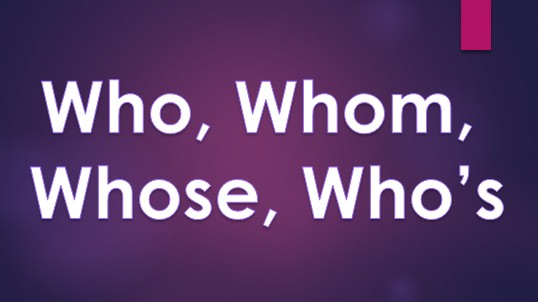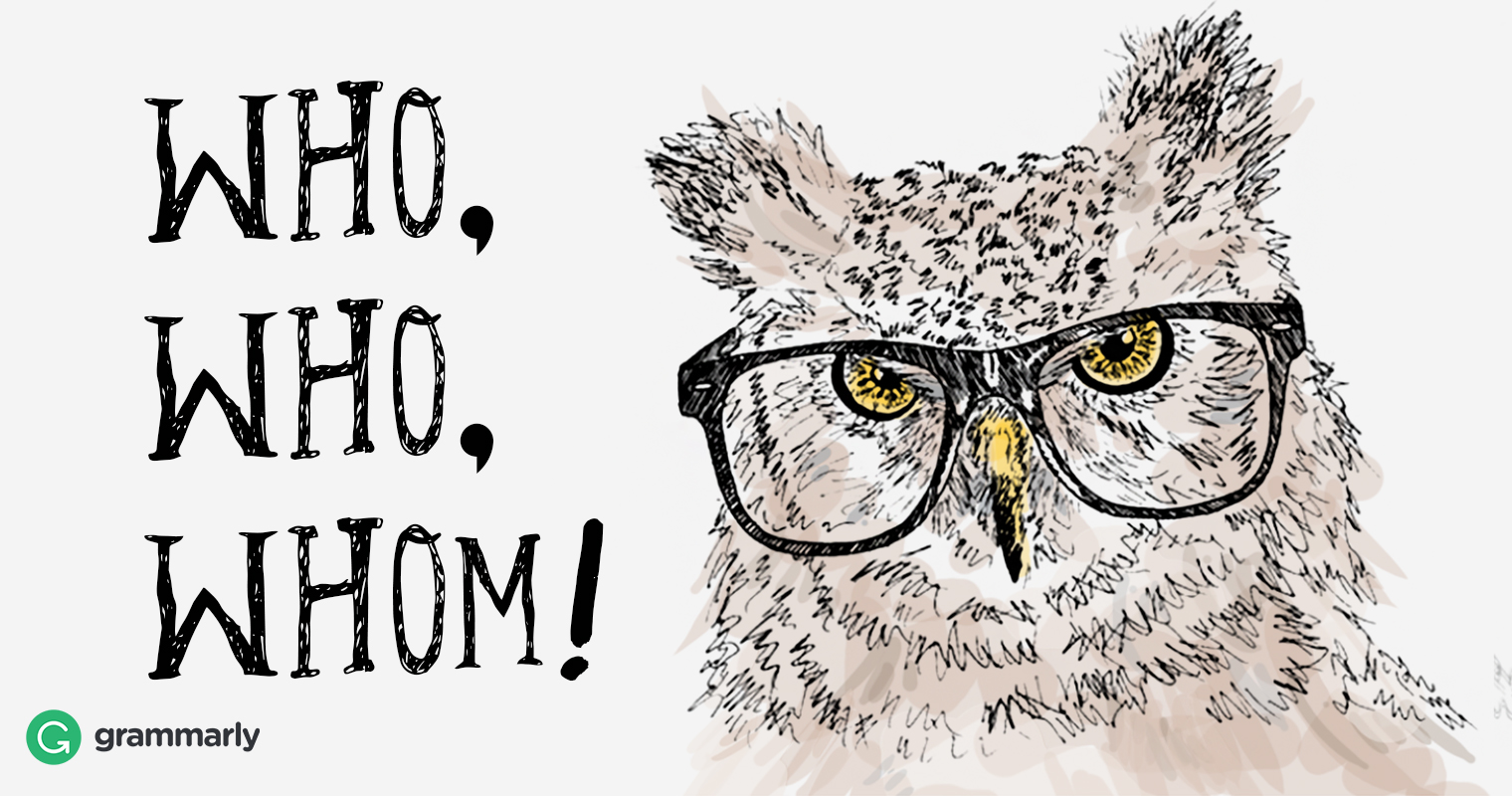WHO pour une personne WHICH pour une chose et THAT plutôt dans le langage parlé. Whom is a more archaic use where it is used instead of who as the object of a verb or preposition.

Quelle Est La Difference Entre Who Et Whom En Anglais
Le pronom relatif utilisé dépend de lantécédent qui est le nom placé devant lui et auquel le pronom relatif se réfère.

Différence entre who et whom. Lutilisation de who et de whom nest pas facile car on ne fait pas toujours facilement la différence entre les deux et on utilise lun pour lautre. In the example above the adjective clause tells us about the man Just ignore the main sentence and look at the adjective clause when deciding whether to use who whom or whose Ask yourself if the adjective clause requires a subject object or possessive form. Quant à whom il est utilisé en tant que complément d objet direct ou indirect dun verbe ou dune préposition.
Whom est utilisé en tant quobjet alors que who est utilisé en tant que pronom sujet. What of those mentioned or implied titleThe Celebrity chapter2 passageSunning himself on the board steps I saw for the first time Mr. Which remplace tous les antécédents non-humains animaux choses idées.
Les répartitions géographique et sectorielle du commerce en valeur ajoutée sont très différentes de celles du commerce standard. Both who and whose are pronouns but whose reflects belongingness whereas who tells us about the person that performs an action in a sentence. It is Toms responsibility to make sure there are supplies in the office room.
Adjective clauses are used to describe a noun in the main sentence. Tom is responsible for the office supplies but he is only held accountable owes an explanation for his actions. Que Il est aussi utilisé quand on parle de personnes mais sous forme de QUE.
Who est un pronom relatif utilisé lorsquon parle dun sujet humain. Using Which Who and That This page is about the relative pronouns which who and that They are used to head a clause called a relative clause that provides some information about another word in the sentence usually the word immediately to the left. Whom est un pronom relatif complément dobjet direct ou indirect dun verbe ou dune préposition.
Whom est également un pronom interrogatif mais on lutilise plutôt à la place de lobjet dune question. La différence entre Who et Whom expliquée tout simplement La différence entre who et whom est toute simple. The primary difference between who and whom is that we use who when we want to talk about the subject of a sentence we use whom if we talk about the object of the verb.
Il est lhomme QUE jai rencontré hier. Comprenez bien la différence entre who et whom. What is the difference between Whose and Whos.
On le retrouve souvent après to Which. What is the difference between Whose and Who. Farquhar Fenelon CookeThere was a neat hat-and-umbrella stand and the strangers weary feet fell soft on a good serviceable dark-red drugget which matched in colour the flock-paper on the walls.
Hes the man WHOM I met yesterday. Si lantécédent est une personne ou un animal domestique on emploiera le pronom relatif who pour un cas sujet. Lutilisation du pronom whom en anglais.
Whos is an abbreviated form of who is or who has. Who is used to as a subjective pronoun ie. The term who is primarily used to refer to a person and is used a question to ask about that person.
Tous les deux sont des pronoms. As nouns the difference between shipper and consignee is that shipper is archaic a seaman. The man who is talking is my teacher.
Si vous retenez cela vous saurez choisir et utiliser ces trois pronoms relatifs dans la plupart des cas. On peut donc dire tout simplement. When it is not correct to make use of who is it is better to make use of whose.
It tells you about the subject of the verb. On dira par exemple. Whom est la forme dun pronom relatif pour un complement dobjet.
On the contrary whom is an objective pronoun that highlights the object of the verb. Pour des animaux ou des choses. Cest le pronom qui en français.
Whose is an interrogative pronoun that is used when one is asking about the belongingness of something in a sentence. Le dernier mais non le moindre. Lhomme qui parle est mon professeur.
Whom is this film about. At this point you cannot say Tom has been held accountable answerable for performing this task. Cependant who est utilisé en tant que sujet dans une phrase pour indiquer qui fait quoi par exemple lui ou elle.
It may also be used to give further information about a person typically one that has been previously mentioned. La différence entre le commerce en valeur ajoutée et le commerce standard est plus importante dans le cas du commerce régional mais ce nest pas plus le cas en Asie quen Amérique. This is the house WHICH I bought.
Whose is a possessive form of who. Whom est utilisé en tant quobjet alors que who est utilisé en tant que pronom sujetComme lillustrent ces deux exemples la règle veut que si la réponse à la question est he pronom sujet il faut alors util. So Tom will be aware of this task and keep bringing in more supplies before they run out.
Ou Whom did he blame for the accident. La différence entre Who et Whom expliquée tout simplement La différence entre who et whom est toute simple. Skipper or shipper can be fandom slang one involved in shipping fan fiction based on romantic relationships between characters while consignee is the person to whom a shipment is to be delivered.
Pronoun English Pronouns lb Who. Whom semploie aussi dans des affirmations à la place de lobjet dune clause.

Comment Faire La Difference Entre Which Et Whose En Anglais Youtube
:quality(90)/f/78828/1920x750/a55dbf7b7b/ef-blog-header-menggenal-materibhsinggris.jpg)
Perbedaan Who Whos Whom Dan Whose
:quality(90)/f/60990/750x420/d6a707e578/relative-pronoun.png)
Relative Pronoun Perbedaan Who Whom Whose Which That Ef Blog

Comment Utiliser Who Et Whom Correctement 6 Etapes

Who Vs Whom Differences Between Who And Whom Examples

Understand The Difference Between Who Whom Whose Youtube

Perbedaan Arti Who Whom Whose Who S Contoh Kalimat Fabelia

Comment Choisir Entre Who Et Whom Grammaire Anglaise Pratique Youtube
